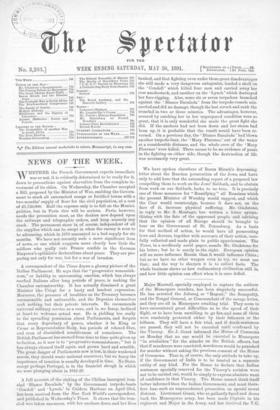Major Maxwell, specially employed to capture the authors of the
Muneepore murders, has been singularly successful. He has arrested the joboraj, or "Regent," the Senaputty, and the Tongal General, or Commandant of the savage levies, and they are all in Muneepore awaiting trial. They seem to have encountered great difficulties as to the speed of their flight, or to have been unwilling to go far, and none of them were resolutely protected either by their followers or the hillmen. They will have a fair trial, and if death-sentences are passed, they will not be executed until confirmed by the Viceroy. Sir J. Gorst informed the House of Commons on Monday that no one would be executed in Muneepore "in retaliation" for the attacks on the British officers, but that if murderers were convicted, murderers would be punished for murder without asking the previous consent of the House of Commons. That is, of course, the only attitude to take up, if the Government of India is to be treated as a separate entity of any kind. For the House to declare that Indian sentences specially reserved for the Viceroy's revision were not to be carried out, would be simply to express absolute want of confidence in that Viceroy. The House cannot think itself better informed than the Indian Government, and must there- fore base such an unprecedented precaution on special moral distrust. Lieutenant Grant, who so gallantly faced and drove back the Muneeporee army, has been made Captain in his regiment and Major in the Army, and has received the V,0,






































